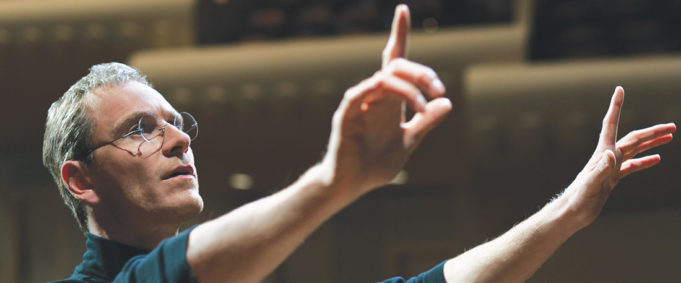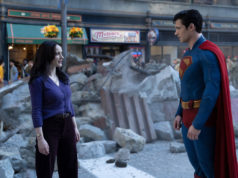“Artists lead and hacks ask for a show of hands!” That might just be the most Aaron Sorkin thing that anybody has ever said in an Aaron Sorkin drama. (I think Mao Tse-tung would have approved of the sentiment, too.) Just when I thought The Martian’s Drew Goddard might have usurped Sorkin’s place as Hollywood’s favorite writer of blurringly fast, wonky, high-stakes office banter, here Sorkin comes back with Steve Jobs. A movie about the late tech guru proves to be a cozy fit for Sorkin, a chance for him to write another highly entertaining tale of a brilliant, megalomaniacal white guy who acts like he knows what’s best for the rest of us because he actually does. Replete with Sorkinesque references to Seiji Ozawa, Alan Turing, and Joe DiMaggio, this shiny new product is hard to resist.
Where a traditional biopic covers as much ground as possible between childhood and death, this film is like a three-act play, with its action concentrated around three product launches in Jobs’ career: the Macintosh computer in 1984, the NeXT computer in 1988, and the iMac in 1998. As Steve (Michael Fassbender) putters around backstage preparing to introduce each product to a roaring crowd, he holds conversations — only sometimes willingly — with marketing director Joanna Hoffman (Kate Winslet), Apple co-founder Steve Wozniak (Seth Rogen), Apple CEO John Sculley (Jeff Daniels), chief programmer Andy Hertzfeld (Michael Stuhlbarg), tech journalist Joel Pforzheimer (John Ortiz), his ex-wife Chrisann Brennan (Katherine Waterston), and their daughter Lisa (played variously by Makenzie Moss, Ripley Sobo, and Perla Haney-Jardine). Steve comments on the unlikelihood of running into the same people at all these different events: “It’s like five minutes before every launch, everybody gets drunk at a bar and comes and tells me what they really think.”
It takes all of director Danny Boyle’s talent to keep this thing from feeling stagey. Sorkin’s torrent of dialogue comes dangerously close to resembling a rap song that’s all flow and no hook. The verbiage is draining to listen to, and we’ve never heard a Sorkin script this wordy. (Although I haven’t seen his TV show The Newsroom. Is it as bad as this?) Somehow, Boyle takes this rigidly structured screenplay set in an endless series of hallways, greenrooms, and stage wings, and makes it into something that sweeps us up with an almighty whoosh. He doesn’t do a perfect job — the final shot bathing Steve in an ethereal glow is a step too far, and neither Boyle nor Winslet can keep Joanna’s tearful plea for Steve to reconcile with his daughter from being maudlin. Still, the director of 127 Hours and Slumdog Millionaire brings great driving energy to the movie and gives it a polish that would have pleased the real Jobs.
This thing is fun to hear and must have been even more fun to perform. That’s why great actors keep getting drawn to Sorkin’s work. It’s rewarding to play someone who’s smart and funny, and that describes every character in a Sorkin script except for the occasional villain who’s too stupid to understand what’s going on. You might not have expected Rogen to ever share the screen with the likes of Fassbender and Winslet, but he’s the best of this feted supporting cast, especially in the third act when Woz angrily stands up after years of Steve treating him like a doormat: “It’s not binary, Steve! It’s not either-or! You can be talented and decent!”
Fassbender works well with him and everybody else, which is good because he’s on screen for pretty much the whole movie. A character who constantly compares himself to Picasso, Einstein, and Bob Dylan tends to make for exhausting company, but Fassbender captures the magnetic genius that causes people to follow him without shortchanging Steve’s overbearing perfectionism and ego. (When asked why he alienates so many people, he says, “God sent His only son to die, but we like Him anyway, ‘cause He made trees!”) Steve coldly tells his 5-year-old daughter that his Lisa computer wasn’t named after her and then, a few minutes later, holds up her Mac-drawn picture as an example of what he wants to do for the world. Fassbender makes all this feel like it’s coming from the same person, and he captures Jobs’ insecurities and grand visions, his high-handedness and egalitarianism, with intimidating ease.
In short, Steve Jobs succeeds at everything the Ashton Kutcher-starring Jobs failed at. The wizard of Cupertino left behind a complicated legacy that changed everything about how we interact with the world. There’s tons of material from Jobs’ life that this movie has left unmined, but what is here is a tribute to the visionary that grapples with his flaws as well, and it leaves you feeling wiser. That’s enough to make me raise my iPhone in salute.
[box_info]Steve Jobs
Starring Michael Fassbender and Kate Winslet. Directed by Danny Boyle. Written by Aaron Sorkin, based on Walter Isaacson’s biography. Rated R.[/box_info]












